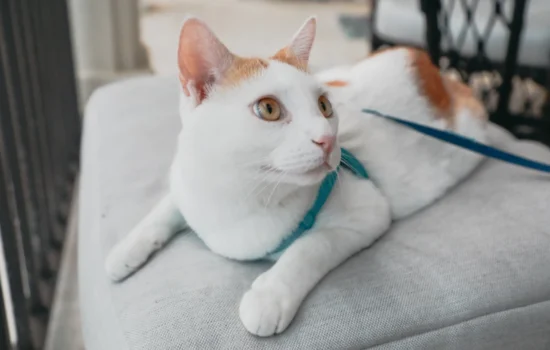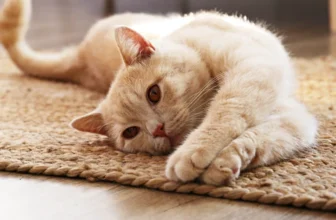As a devoted pet owner, it’s vital to ensure your furry companion’s well-being. While American Shorthair cats are known for their robust health, it’s crucial to schedule regular wellness exams with your veterinarian. These checkups can help detect health issues early on, prevent potential diseases, and maintain your cat’s quality of life. In this article, we’ll delve into the importance of regular wellness checkups for American Shorthair cats, what to expect during an exam, how often you should schedule visits, and tips for preparing your furry friend for a vet visit. So, let’s get started!
The Benefits of Regular Checkups
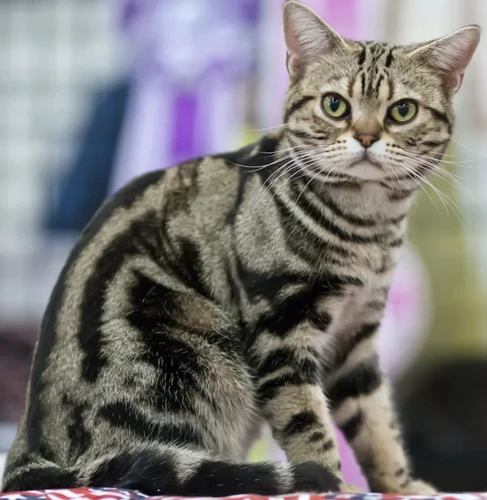
Regular wellness checkups are crucial for the overall health and well-being of your American Shorthair. While cats are known for their independence and self-sufficient nature, they still need routine checkups to ensure they are healthy and happy. Not only can regular checkups prevent diseases and health issues, but they can also detect and treat conditions early on, leading to an improved quality of life. In this section, we will explore the various benefits your cat can gain from regular wellness checkups.
Prevention of Diseases and Health Issues
Regular wellness checkups are essential for the prevention of diseases and health issues in American Shorthair cats. Prevention is always better than cure, and a thorough physical exam can help your veterinarian identify potential health issues before they become more severe. By doing so, you can save a significant amount of money on veterinary bills and, more importantly, keep your cat healthy.
During a wellness checkup, your veterinarian will check your cat’s weight, temperature, heart and respiratory rates, coat condition, and overall body condition. Your cat’s eyes, ears, nose, and mouth will also be examined to detect any abnormalities or signs of infection. Regular dental exams are particularly important for American Shorthair cats, as they are more prone to dental problems, such as gingivitis and periodontal disease, which can lead to tooth loss and other health issues.
Parasite prevention and control are crucial aspects of wellness checkups for your American Shorthair cat. Your veterinarian will check your cat for fleas, ticks, and other parasites and recommend appropriate medications for preventative treatment. Parasites can cause a variety of health problems, including skin irritation, hair loss, anemia, and even life-threatening illnesses.
Vaccinations are also an important component of routine wellness checkups. Vaccines protect your cat against a range of infectious diseases, including feline distemper, rabies, and respiratory viruses. Your veterinarian can help you determine which vaccines your cat needs based on factors such as their lifestyle and risk of exposure to certain diseases.
Blood tests and urinalysis are additional screening tests that can be performed during wellness checkups. These can help detect underlying health problems that may not be evident during a physical exam. For example, blood tests can detect problems with your cat’s liver, kidneys, and thyroid gland, while urinalysis can identify urinary tract infections or other kidney-related issues.
Regular wellness checkups can also help prevent other health issues commonly seen in American Shorthair cats, such as feline lower urinary tract disease, obesity, asthma, arthritis, infectious diseases, allergies, hairballs, and dehydration. By working with your veterinarian and following their recommendations, you can help keep your American Shorthair cat in good health and provide them with a long and happy life.
Early Detection and Treatment of Health Conditions
Regular wellness checkups are important for ensuring the health and well-being of your American Shorthair cat. One of the key benefits of these checkups is the early detection and treatment of health conditions.
Early detection: During a wellness checkup, your vet will conduct a thorough examination of your cat’s body, including the ears, nose, throat, skin, and eyes. They will also check for any lumps or bumps that could indicate a potential health issue. Additionally, blood tests and urinalysis can identify early signs of diseases such as kidney disease, diabetes, and liver disease.
Treatment: If your vet does detect a health condition or disease, early detection means you can start treatment right away. This can prevent the condition from worsening or causing permanent damage to your cat’s health. Treatment options may include medication, lifestyle changes, or surgery, depending on the condition.
Some common health conditions in American Shorthair cats that can be detected early during checkups include dental problems, arthritis, allergies, asthma, dehydration, and infectious diseases. For example, routine dental exams can help detect dental diseases, such as gingivitis and periodontitis. This can help prevent serious dental issues, such as tooth loss and gum disease.
It’s worth noting that obesity is a common issue in American Shorthair cats, which can lead to a range of health problems, including diabetes and joint pain. By detecting obesity early, you can work with your vet to develop a weight-loss plan tailored to your cat’s needs. You can find some tips for preventing obesity in American Shorthair cats in our article on preventing obesity in cats.
Regular wellness checkups are critical for the early detection and treatment of health conditions in American Shorthair cats. By staying on top of your cat’s health, you can help ensure they live a long and healthy life.
Improved Quality of Life
Regular wellness checkups for American Shorthair cats not only detect early signs of illness and disease but also help improve their overall quality of life. During checkups, the veterinarian will not only address any health concerns but also offer advice on proper nutrition, exercise, and behavior, which can be very important to maintaining a happy and healthy feline through all stages of life. Here are a few ways that regular checkups can improve your American Shorthair cat’s well-being:
- Prevention of Dental Problems: Dental problems are common in cats of all ages. Regular dental exams during wellness checkups can prevent issues such as plaque buildup, dental caries, and gum disease that could cause pain and discomfort. Maintaining good dental hygiene is especially important as they age since untreated dental issues can lead to more serious health problems like heart diseases and kidney problems.
- Management of Chronic Conditions: American Shorthair cats can develop chronic conditions such as asthma, arthritis, or allergies that affect their quality of life. Regular checkups will pick up on these early and help manage the condition and symptoms properly. The veterinarian may prescribe medication and recommend lifestyle changes, such as a specific diet or exercise regimen, to minimize symptoms and prevent flare-ups.
- Prevention and Early Detection of Infectious Diseases: Cats are susceptible to infectious diseases that can be transmitted by other animals or through environmental factors. Vaccinations, blood tests, and urinalysis done during the checkup can help detect any early signs of disease or infection, and protect your American Shorthair cat from viruses and other illnesses.
- Identification and Management of Parasites: Fleas, ticks, worms, and other parasites can cause serious health problems in cats. Regular checkups can detect parasites and offer appropriate treatment, including preventative medications to keep your American Shorthair protected.
- Prevention of Dehydration: Dehydration can be a common health problem in cats and can lead to kidney damage if left untreated. Regular visits to the veterinarian can ensure that cats are hydrated and recommend fluid therapy as necessary. Also, owners can keep the drinking water fresh and readily available for their feline friends to avoid dehydration.
- Prevention of Obesity: Obesity can pose significant health risks to cats, including diabetes, heart and respiratory problems. During wellness checkups, the veterinarian can weigh your cat as part of overall evaluation of their fitness and provide advice on proper nutrition and exercise for weight management.
- Improved Longevity and Healthspan: Regular wellness checkups provide peace of mind for cat owners and provide an early response to health problems. These checkups can prevent or mitigate illnesses and conditions that would affect your American Shorthair cat’s healthspan and longevity.
Remind yourself of these key points by keeping our article on the importance of proper dental care, managing arthritis, treating dehydration, and other health-related articles that apply to American Shorthair cats to ensure that you are doing everything to keep your feline friend happy and healthy.
What to Expect from a Regular Wellness Checkup
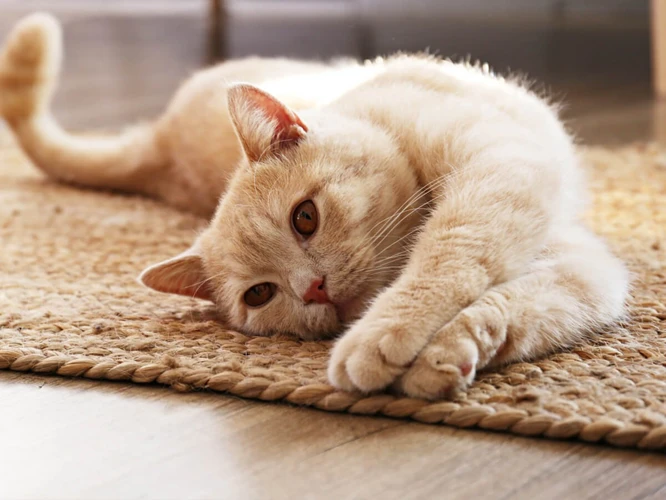
As a cat owner, bringing your American Shorthair for a regular wellness checkup is a vital part of maintaining their health. During these visits, the vet will conduct a thorough examination to ensure your furry friend is healthy and happy. It’s a great opportunity to discuss any concerns you may have and ask the vet for advice on issues such as allergies, asthma management, hairball control, and the prevention of infectious diseases. In this section of the article, we will discuss what to expect from a regular wellness checkup and how it can benefit your feline friend.
Physical Examination
During a regular wellness checkup for your American Shorthair cat, a physical examination will be conducted by the veterinarian to check for any visible signs of health issues. This may include:
- Checking for any lumps or bumps on their body with palpation.
- Examining their eyes, ears, and nose for any signs of infection or abnormalities.
- Checking their teeth and gums for dental issues, such as tartar buildup or gingivitis.
- Assessing their heart and lungs for any signs of issues, such as abnormal rhythms or decreased lung sounds.
- Checking their abdomen for any signs of discomfort or pain.
- Examining their joints and limbs for any signs of stiffness, pain or arthritis.
During the physical examination, it’s important to communicate with the veterinarian any concerns or changes you’ve noticed in your cat’s behavior or health. This may include changes in appetite, weight, energy level, or bowel movements. The veterinarian will perform a comprehensive physical examination to ensure your cat is healthy and provide recommendations for your pet’s care.
Remember: Regular wellness checkups are essential to ensure that your American Shorthair cat remains healthy. Preventive care is the best medicine, and early detection and treatment of health issues can improve your cat’s quality of life. So, if you notice any changes in your cat’s behavior or health, schedule an appointment with your veterinarian right away.
Dental Exam
During a regular wellness checkup, your American Shorthair cat will also receive a dental exam. This is an important aspect of overall health, as dental problems can lead to other more serious issues. Here are some of the things you can expect during a dental exam:
- Inspection of teeth and gums: The veterinarian will examine your cat’s teeth and gums to check for any signs of decay, infection, or inflammation. They will also look for any abnormalities, such as broken or misaligned teeth.
- Cleaning: If necessary, the vet will clean your cat’s teeth, removing any built-up plaque or tartar. This will prevent bacteria from causing problems and keep your cat’s mouth healthy.
- X-rays: In some cases, the veterinarian may recommend taking x-rays of your cat’s teeth to check for any underlying issues that might not be visible during a regular exam.
- Oral cancer screening: Finally, the veterinarian will check your cat’s mouth for any signs of oral cancer. This is important because early detection can significantly improve the chances of successful treatment.
It’s important to remember that dental problems can be easily prevented with regular at-home care. Brushing your cat’s teeth and providing dental treats or toys can help remove built-up plaque and tartar. However, if your cat is resistant to at-home dental care or has significant dental problems, a professional cleaning may be necessary.
Regular dental exams are crucial for the overall health and well-being of your American Shorthair cat. By keeping their teeth and gums healthy, you can prevent more serious medical issues from developing.
Parasite Prevention and Control
Cats, especially outdoor cats like American Shorthairs, are vulnerable to parasitic infections. Parasites are not only harmful to your cat but can also transmit diseases to humans, which makes preventing and controlling parasites crucial. During a regular wellness checkup, your vet will discuss parasite prevention and control measures with you. Here are some common methods:
- Flea and tick prevention: Fleas and ticks are common parasites that can cause discomfort, skin irritation, and transmit diseases like Lyme disease and tapeworms. Your vet may recommend topical or oral medications to prevent flea and tick infestations. They may also suggest using flea and tick collars and regularly checking your cat for fleas and ticks, especially after going outside.
- Heartworm prevention: Heartworms are transmitted by mosquitoes and can cause severe respiratory and heart problems. Treatment is difficult and expensive, so prevention is key. Your vet may recommend oral medications to prevent heartworm infections, especially during mosquito season.
- Deworming: Cats can contract several types of worms, such as roundworms, hookworms, and tapeworms. These parasites can cause diarrhoea, weight loss, and other health problems. Deworming medications can effectively eliminate these parasites, and your vet may advise regular deworming for outdoor cats.
It’s essential to follow your vet’s recommendations for parasite prevention and control to keep your American Shorthair cat healthy and disease-free. Additionally, regularly cleaning your cat’s bedding, litter box, and toys, and keeping their living area free of debris can also help prevent parasites from infesting your cat.
Vaccinations
Vaccinations are a crucial aspect of a cat’s healthcare regimen and are often administered during a regular wellness checkup. Their role in protecting your American Shorthair from potentially fatal diseases cannot be overstated. Pet owners should be aware of the necessary vaccinations that their cat should receive, and the timing of these vaccinations, as well as the possible side effects.
Common vaccines given to American Shorthair cats include the FVRCP (feline viral rhinotracheitis, calicivirus, and panleukopenia) vaccine and the rabies vaccine. These vaccines protect against viruses that can cause respiratory infections, neurological diseases, and other fatal conditions. The FVRCP vaccine is usually administered in a series of doses during kittenhood and is then given on a regular schedule, while the rabies vaccine is usually given annually or every three years.
Cats can also receive additional vaccines based on their lifestyle and living conditions. For instance, if your American Shorthair spends time outdoors, they may need additional protection against diseases like Feline leukemia (FeLV) and Feline immunodeficiency virus (FIV). It’s important to discuss your cat’s lifestyle with your veterinarian, so they can recommend the appropriate vaccines.
While vaccines are generally considered safe, it’s important to monitor your American Shorthair for possible side effects after receiving vaccinations. Most side effects are mild and will resolve on their own, but some cats may experience more serious reactions. These can include fever, lethargy, swelling, and allergic reactions. If you notice any of these symptoms, contact your veterinarian immediately.
Here is a table outlining some common vaccines for American Shorthair cats:
| Vaccine | Disease(s) protected against | Recommendation |
|---|---|---|
| FVRCP | Feline viral rhinotracheitis, calicivirus, and panleukopenia | Initial series during kittenhood, then regular boosters |
| Rabies | Rabies | Annually or every three years, depending on vaccine type |
| FeLV | Feline leukemia | Recommended for outdoor cats or cats with potential exposure to infected cats |
| FIV | Feline immunodeficiency virus | Recommended for outdoor cats or cats with potential exposure to infected cats |
Remember that vaccines are just one part of a comprehensive healthcare plan for your cat. Regular wellness checkups, proper nutrition, and parasite prevention are all important aspects of keeping your American Shorthair healthy and happy. Consult with your veterinarian to create a personalized plan that is tailored to your cat’s specific needs.
Blood Tests and Urinalysis
During a regular wellness checkup for your American Shorthair cat, your veterinarian may request blood tests and urinalysis to ensure your feline’s overall health. These tests are essential in detecting underlying health issues that may not show any visible symptoms.
Blood tests give an idea about the state of your cat’s internal organs and general health. The tests can reveal unusual values in various things, such as kidney function, liver function, blood sugar, and thyroid hormone levels. If there are any abnormalities, further diagnosis and treatment can be initiated swiftly, ensuring your cat’s health.
A urinalysis provides information about your cat’s urinary tract system. This test can detect if there are any bladder or urinary tract infections or any signs of kidney problems. If left untreated, these infections can lead to more severe health problems. The vet will use a urine sample to detect excessive protein, sugar, or blood levels in the urine, which can signal an underlying health issue.
Both blood tests and urinalysis are essential tools in identifying the early stages of many illnesses. In some cases, these tests may also be vital before a procedure or surgery to verify that your feline is healthy enough for anesthesia or surgery.
Although these tests are an essential tool for your cat’s health, it is crucial to remember that they often come with additional costs. This is why regular wellness checkups can be beneficial for detecting underlying health problems before they become severe, ultimately saving you money in the long run.
Blood tests and urinalysis are an integral part of a cat’s wellness checkup. They can help a veterinarian identify potential health issues in cats before symptoms show up, ensuring timely intervention. These tests add an extra layer of care to your cat’s health and well-being, and investing in regular wellness checkups can ultimately provide peace of mind and save you money on vet bills.
How Often Should You Bring Your American Shorthair for a Checkup?
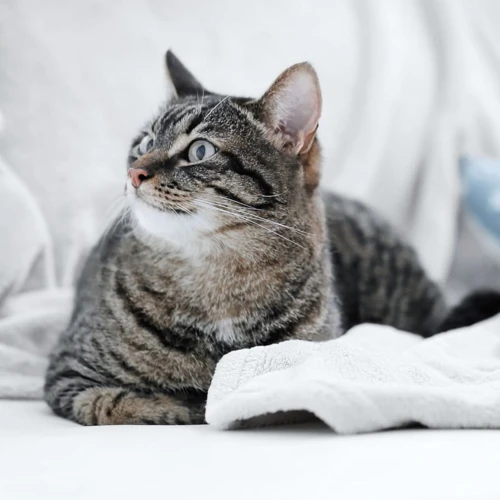
As a cat owner, you may be wondering how often you should take your American Shorthair for a checkup. Regular wellness checkups are essential for maintaining your cat’s health and preventing any potential issues from becoming serious. But how often should you bring your furry friend to the vet? The answer depends on several factors, including their age and current health status. Let’s dive deeper into this topic to understand the importance of regular checkups and how often you should schedule them.
Kittenhood
Kittenhood
During the first year of life, American Shorthair kittens go through various growth stages and developmental changes. It is crucial to schedule regular wellness check-ups with your veterinarian to monitor their health. Here are some guidelines for bringing your kitten to the vet:
- Schedule frequent visits: During their first year of life, kittens should visit the veterinarian every 3-4 weeks to receive vaccinations and monitor their growth and development.
- Record keeping: Bring your kitten’s medical records and any questions you may have for the vet.
- Physical exam: During the visit, your veterinarian will perform a thorough physical exam to check for any abnormalities or health issues.
- Vaccinations: Kittens need a series of vaccinations to protect them from various diseases. Your vet will provide a vaccination schedule based on your kitten’s age and risk factors.
- Deworming: Kittenhood is a common time for parasite infection, your vet will provide the necessary deworming treatment based on the exam results.
- Spay or neuter consultation: American Shorthair kittens can be spayed or neutered as early as 8 weeks old. Schedule a consultation with your vet regarding the ideal time for your kitten.
As with any animal, it is essential to prioritize your kitten’s health, especially during this growth and development period. Regular wellness check-ups ensure that any concerns are addressed, and treatments can be provided in a timely manner, setting a foundation for a healthy adult life.
Adult Years
During the adult years, which are typically from 1 to 7 years old for American Shorthair cats, it is recommended to bring them in for a wellness checkup at least once a year. This is to ensure that any potential health issues or diseases are caught early on and can be treated promptly.
The following table lists some of the recommended examinations and procedures to be done during a typical wellness checkup for adult American Shorthair cats:
| Examination/Procedure | Description |
|---|---|
| Physical Examination | A thorough examination of the cat’s overall health, including body condition, weight, teeth and gums, ears, eyes, and coat. The vet will also check for any lumps, bumps, or abnormalities. |
| Dental Exam | The vet will examine the cat’s teeth and gums for any signs of dental disease or infection. They may also recommend a professional cleaning if necessary. |
| Parasite Prevention and Control | The vet will check for any signs of external or internal parasites, and may recommend preventative measures such as flea and tick control or deworming. |
| Vaccinations | Adult American Shorthair cats should receive regular vaccinations to protect against common diseases such as rabies, feline leukemia, and distemper. |
| Blood Tests and Urinalysis | The vet may recommend blood tests and a urinalysis to check for any underlying health problems such as kidney disease or diabetes. |
Additionally, during the adult years, it’s important to keep a close eye on your cat’s behavior and habits. Changes in appetite, activity levels, or litter box habits may be signs of an underlying health issue. It’s also important to provide your cat with a well-balanced diet and plenty of opportunities for exercise and play. By following these guidelines and scheduling regular checkups, you can help ensure that your adult American Shorthair cat stays healthy and happy for years to come.
Senior Years
As your American Shorthair cat enters their senior years, it becomes even more crucial to bring them for regular wellness checkups. Senior cats are more prone to developing numerous health conditions, including kidney disease, heart problems, and arthritis. These conditions can become more severe if left untreated. During a routine wellness checkup, your veterinarian will be able to evaluate your cat’s overall health and identify any potential issues.
Here are some specific areas of focus during a senior cat’s regular wellness checkup:
- Physical Examination: Your vet will perform a thorough physical exam to check for any outward signs of health issues such as lumps, bumps, or changes in weight or posture. They will also assess your cat’s mobility and look for signs of arthritis.
- Blood Tests: Blood tests are especially important for senior cats. Your vet will be able to evaluate your cat’s organ function, including their kidneys, liver, and thyroid. Any abnormalities can be addressed and treated early on.
- Urinalysis: Urinary problems become more common in senior cats. A urinalysis can identify any issues such as bladder infections, crystals, or kidney problems.
- Dental Exam: Dental disease can become more common in aging cats. Your vet will evaluate your cat’s dental health and make recommendations for routine dental cleaning or other dental care, if necessary.
- Additional Testing: Depending on your cat’s specific needs, your vet may recommend further tests such as X-rays or ultrasound to evaluate internal organs and bones.
By bringing your senior American Shorthair cat for regular wellness checkups, you can ensure that they receive the proper care and treatment to maintain their health and quality of life in their senior years. Keep in mind that senior cats may require more frequent checkups, so be sure to follow your vet’s recommendations for scheduling these appointments.
Tips for Preparing Your American Shorthair for a Vet Visit
Going to the vet can be a stressful experience for any cat, including American Shorthairs. To make the visit more comfortable and less overwhelming for your furry friend, there are several things you can do to prepare them beforehand. By taking a few extra steps, you can help your American Shorthair feel more at ease and ensure they receive the best possible care from their vet. Here are some tips to help you prepare your feline companion for their next checkup.
Crate Training
One of the most important things you can do to prepare your American Shorthair for a visit to the vet is to crate train them. This will not only make the trip to the vet less stressful for your feline friend, but it will also help to keep them safe and secure during transport. Here are some tips on how to successfully crate train your American Shorthair:
| Start Early | Make it Comfortable | Positive Reinforcement |
|---|---|---|
| Start the crate training process as early as possible, preferably when your American Shorthair is still a kitten. This will allow them to become familiar with the crate before any vet visits or other situations where they may need to be crated. | Make the crate comfortable for your cat by adding soft blankets or a pillow. You can also place a favorite toy or treat inside to make it more inviting. | Always use positive reinforcement when crate training your American Shorthair. Offer treats and praise when they enter the crate on their own, and gradually increase the amount of time they spend in the crate. |
| Start Early | Make it Comfortable | Positive Reinforcement |
| Start the crate training process as early as possible, preferably when your American Shorthair is still a kitten. This will allow them to become familiar with the crate before any vet visits or other situations where they may need to be crated. | Make the crate comfortable for your cat by adding soft blankets or a pillow. You can also place a favorite toy or treat inside to make it more inviting. | Always use positive reinforcement when crate training your American Shorthair. Offer treats and praise when they enter the crate on their own, and gradually increase the amount of time they spend in the crate. |
Remember, crate training takes time and patience. Be sure to start early and use positive reinforcement to help your American Shorthair feel comfortable and secure in their crate. By doing so, you will not only make vet visits less stressful for them, but also ensure they are safe during travel.
Car Rides
It is essential to prepare your American Shorthair for car rides before taking them to the vet. Many cats don’t enjoy car rides, and it can be a stressful experience if they aren’t used to it. Here are some tips for making car rides more comfortable for your cat:
| Tip 1: | Prepare your cat’s crate by adding a soft blanket or towel. This will make it more comfortable and cozy for your cat during the ride. |
| Tip 2: | Start with short rides around the block to get your cat used to being in the car. Gradually increase the duration of the trips to longer distances. |
| Tip 3: | Keep the car quiet and avoid loud music or sudden noises that can startle your cat. This will help your cat to stay calm and relaxed during the ride. |
| Tip 4: | Use a harness or carrier to secure your cat in the car. This will prevent them from moving around the car and possibly injuring themselves or distracting the driver. |
| Tip 5: | If your cat gets motion sickness, talk to your veterinarian about possible medication or supplements that can help alleviate the symptoms. |
By following these tips, you can help make car rides a more comfortable experience for your American Shorthair. It’s important to remember that cats are sensitive animals, and it may take some time for them to get used to new experiences like car rides. Be patient, and always reward your cat with treats and positive reinforcement after a successful car ride.
Handling and Socialization
When it comes to preparing your American Shorthair cat for a vet visit, proper handling and socialization play a key role in reducing their stress and anxiety. Here are some tips to help your furry friend feel more comfortable:
| Tip | Description |
|---|---|
| Start Young | Getting your kitten used to being handled and touched is crucial for their overall well-being. Make sure to start socializing them from a young age through petting and holding them for short periods of time. |
| Use Positive Reinforcement | Reward your cat with treats and praise for good behavior during handling, such as staying calm and relaxed or not resisting. This can help them associate vet visits with positive experiences. |
| Practice Regularly | Handling and socialization should be an ongoing process, not just for vet visits. Making it a regular part of your cat’s routine can reduce their anxiety and stress overall. |
| Respect Boundaries | Make sure to pay attention to your cat’s body language and respect their boundaries. If they show signs of discomfort or stress, such as hissing or growling, stop handling them and give them space. |
| Use Calming Techniques | If your cat is particularly anxious or stressed during vet visits, there are several calming techniques that can be used, such as the use of pheromone sprays or bringing along their favorite toy or blanket. |
By following these tips, you can help your American Shorthair feel more comfortable and relaxed during vet visits, making it easier for them to receive important wellness checkups and care.
Treats and Rewards
When it comes to preparing your American Shorthair for a visit to the vet, using treats and rewards can go a long way. Not only does this help to create positive associations with the vet, but it can also make the experience less stressful for your pet. Here are some tips for using treats and rewards effectively:
- Choose the Right Treats: Not all treats are created equal, and some may be more enticing to your cat than others. Experiment with different types and flavors to find what your cat likes best.
- Bring Enough Treats: Make sure to bring enough treats to last the duration of the appointment. This will help keep your cat distracted and calm throughout the exam.
- Time Your Treats: Give your cat treats at strategic points during the visit, such as right before or after a procedure. This will help to reinforce positive behaviors and create a relaxing environment.
- Don’t Overdo It: While treats can be a great tool, it’s important not to overdo it. Giving your cat too many treats can lead to digestive upset and may even make them sick.
- Reward Good Behavior: Be sure to praise and reward your cat for good behavior, such as staying calm during an exam or allowing the vet to touch their paws. This positive reinforcement will go a long way in creating a more comfortable experience for your pet.
By using treats and rewards thoughtfully and strategically, you can help make vet visits a more positive and less stressful experience for your American Shorthair.
Conclusion
In conclusion, regular wellness checkups are crucial for maintaining the health and well-being of your American Shorthair cat. By bringing your cat in for routine exams, you can prevent potential health issues before they arise, detect any problems early on, and improve their overall quality of life.
Remember, a typical wellness checkup includes a physical examination, dental exam, parasite prevention and control, vaccinations, and blood tests and urinalysis. Your veterinarian will also be able to provide advice on proper nutrition and exercise to keep your cat healthy and happy.
It’s important to bring your American Shorthair in for regular checkups at different stages of their life, including kittenhood, adult years, and senior years. By doing so, you can ensure that any health changes are caught early and treated promptly.
When preparing for a vet visit, make sure to crate train your cat, get them comfortable with car rides, and practice handling and socializing with them. And don’t forget to reward your furry friend with treats for good behavior throughout the visit!
Overall, by prioritizing routine wellness checkups, you can help your American Shorthair cat live a long, happy, and healthy life. So schedule that appointment with your veterinarian today and give your feline friend the care they deserve.
Frequently Asked Questions
How often should I take my American Shorthair for a wellness checkup?
For kittens, they should have at least three wellness exams before they reach six months old. After that, annual checkups are recommended for healthy adult cats. Senior cats, those over seven years of age, should see their vet twice a year.
What should I expect during a physical examination?
The vet will check your cat’s eyes, ears, skin, coat, and general body condition. They will also take their temperature, listen to their heart and lungs, palpate their abdomen, and examine their teeth and gums. The vet will also check your cat’s weight and ask about their behavior and diet.
Why is dental health important for American Shorthair cats?
Poor dental health can lead to bad breath, gum disease, tooth decay, and even systemic infections in cats. Regular dental checkups and cleanings can prevent these issues and keep your American Shorthair’s teeth and gums healthy.
What vaccines does my American Shorthair need?
Common vaccines for cats include those for feline viral rhinotracheitis, calicivirus, and panleukopenia. Your vet may also recommend getting your cat vaccinated against feline leukemia, rabies, and other diseases depending on their lifestyle and risk factors.
What are some signs that my American Shorthair needs to see the vet?
If your cat is showing signs of illness or distress such as loss of appetite, vomiting, diarrhea, changes in behavior, or respiratory issues, it’s best to contact your veterinarian to schedule a checkup. Weight loss, lethargy, and abnormal discharge can also be signs of health problems.
Why is parasite prevention important for American Shorthair cats?
American Shorthair cats can be susceptible to fleas, ticks, heartworms, and other parasites, which can cause serious health issues. Regular parasite prevention and control can prevent these issues and keep your cat healthy.
What is urinalysis, and why is it important for my cat?
Urinalysis is a diagnostic test that involves analyzing a sample of your cat’s urine. It can help detect urinary tract infections, bladder stones, kidney disease, and other health issues. Your vet may recommend a urinalysis as part of a routine checkup or if your cat is showing signs of urinary problems.
What can I do to make vet visits less stressful for my American Shorthair?
You can crate train your cat to help them feel more secure during car rides and handling. You can also provide familiar items, like blankets or toys, and use treats and rewards to make the experience more positive. Socialization and regular handling can also help your American Shorthair feel more comfortable at the vet.
Why do senior American Shorthair cats need checkups twice a year?
Senior cats are more susceptible to age-related health issues such as arthritis, diabetes, and kidney disease. More frequent checkups can help detect these issues early and prevent complications. It also allows the vet to monitor your cat’s health more closely as they age.
Will my American Shorthair cat always get a vaccine during a wellness checkup?
Not necessarily. Your vet will recommend vaccines based on your cat’s lifestyle and risk factors. If your cat is up-to-date on their vaccines, they may not need any during a particular checkup.

